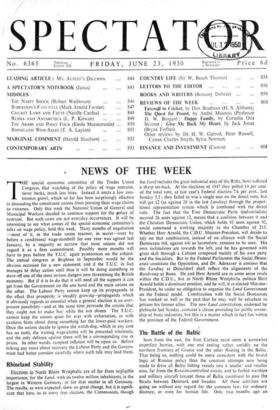Rhineland Stability
Elections in North Rhine Westphalia are of far from negligible importance, for the Land, with its twelve million inhabitants, is the largest in Western Germany, or for that matter in all Germany. The results, as were expected, show no great change, but it is signifi- cant that here, as in every free election, the Communists, though the Land includes the great industrial area of the Ruhr, have suffered a sharp set-back. At the elections of 1947 they polled 14 per cent. of the total vote, at last year's Federal election 7.6 per cent.. last Sunday 5.5 ; they failed to win a single seat on the direct vote, but will get 12 (as against 28 in the last Landtag) through the propor- tional representation system which is combined with the direct vote. The fact that the Free Democratic Party (industrialists) secured 26 seats against 12, means that a coalition between it and , the Christian Democratic Union, which holds 93 seats against 92, could command a working majority in the Chamber of 215. Whether Herr Arnold, the C.D.U. Minister-President, will decide to rely on that combination, instead of on alliance with the Social Democrats (68, against 64) as heretofore, remains to be seen. His own inclinations are towards the left, and he has governed with great skill through a Cabinet composed mainly of his own party and the Socialists. But in the Federal Parliament the Social Demo- crats constitute the Opposition, and Dr. Adenauer is anxious that the Landtag at Dusseldorf shall reflect the alignments of the Bundestag at Bonn. He and Herr Arnold are in some sense rivals within the C.D.U., but in North Rhine Westphalia politics Herr Arnold holds a dominant position, and he will, if re-elected Minister- President, be under no obligation to organise the Land Government on the Federal model. Combination with the Social Democrats has worked so well in the past that he may well be reluctant to jettison his former allies. The new Land constitution, endorsed by plebiscite last Sunday, contains a clause providing for public owner- ship of basic industries, but this is a matter which in fact lies within the province of the Federal Government.


































